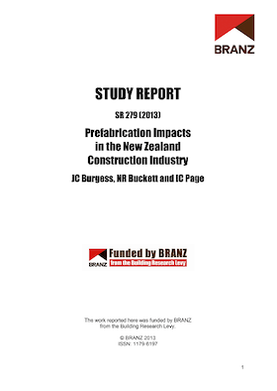
SR279 Prefabrication impacts in the New Zealand construction industry (2013)
Product Description
This report assesses the impact of prefabricated building systems in the New Zealand construction industry, in particular, determining whether there are discernible differences in economic and environmental outcomes between prefabricated building approaches and traditional construction.
The research finds that improved economic outcomes can result from prefabricated building approaches as the necessary focus on project management provides higher levels of budget accuracy, which are not inherent in traditional on-site construction.
The most significant restriction on achieving better economic outcomes appears to be the limited size of the New Zealand market. This is because economies of scale are an important requirement of efficient prefabricated construction. The small New Zealand market size and limited export opportunities may constrain the market's ability to take advantage of the benefits of large-scale prefabricated manufacturing.
Reduced waste, transport, time, energy and greenhouse gas emissions during construction are more readily achievable through the application of prefabricated construction approaches than with traditional on-site construction.
Product Information
| Publication date | 2013 |
|---|---|
| Author | JC Burgess, NR Buckett and IC Page |
| System number | SR279 |